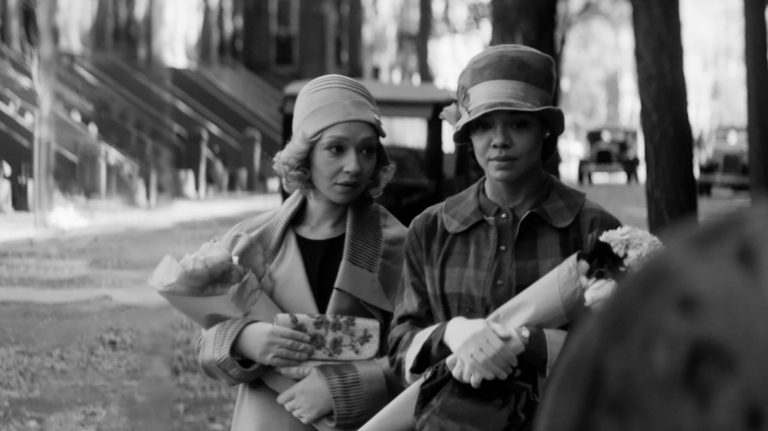Passing (2020 | USA | 98 minutes | Rebecca Hall)
Tessa Thompson and Ruth Negga bring incredible interiority to Rebecca C. Hall’s adaptation of Nella Larsen’s acclaimed Harlem Renaissance novel about two friends divided by appearances in 1920s New York.
When we meet Irene (Thompson), it’s a sweltering day in New York. She’s shopping for her son’s birthday gifts and taking refuge from the heat on a breezy hotel tearoom. Though her eyes dart anxiously from beneath the wide brim of her gauzy hat, society around her barely notices and affords her the many conveniences of passing for a white society lady. There, though, she’s spotted by Clare (Negga), her now-unrecognizable old childhood friend, whose dyed blonde hair and light skin have allowed her entry into a high society life, complete with frequent trips abroad, a child in a Swiss boarding school, and a marriage to a wealthy racist banker (Alexander Skarsgård) who’s oblivious to his wife’s racial background.
Irene is happy with the life she’s created for herself — a successful marriage to a doctor (Andre Holland), a beautiful brownstone in Harlem with a maid, and a prominent role for herself as a leader of a local civic organizations. Their comfortable life is limited by society’s rampant racism, but whereas her husband is ready to cut ties with America and head abroad, she’s eager to stay and preserve this rare bubble of upper-class Black happiness for her two boys as long as possible.
Despite her relative wealth and privilege, Clare finds herself lonely and longing for the life and community that she left behind with her choice to “pass”. Overcoming Irene’s initial resistance, Clare’s increasingly frequent visits to Harlem rekindle a friendship complete with nights out in clubs, hob-knobbing with Black artists, thinkers, and musicians, as well as curious or forward-thinking white tourists to the burgeoning scene. Their chance reunion sparks a bold disregard for the conventions that kept her identity unnoticed that will eventually threaten both Claire’s secret as well as Irene’s delicately-calibreated emotional balance.
It’s a story that especially meaningful to Hall, who learned recently of her own mixed racial identity, and the care and investment in adapting the novel shows in all of the details of her directorial debut. Shot in lustrous black and white, the film portrays the infrequently seen pleasures of upper-class Harlem: from home life to bridge nights, glittering cocktail parties, and evenings at jazz clubs with dancing and conversations amid local society as well as the quiet frustrations of an anxious life at home. The 4:3 aspect ratio and an intricate sound design keep the focus on her cast’s expressive performances, which often are required to compensate for a script that’s light in explaining the burgeoning jealous paranoia that causes the friendship and Irene’s sanity to fray.
Frustrations with plotting aside, it’s a beautifully filmed acting showcase that builds to an intense and melancholy finale.
Passing opens this weekend at the Landmark Crest. A version of this review originally appeared as part of our Sundance Film Festival coverage. (Header image courtesy Sundance)




